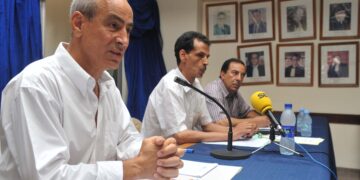Genuine Opportunity for Human Rights Reform or Just More Whitewashing from President Sisi and the Egyptian Government?
عربي
(Washington D.C., October 5, 2021) – A delegation of Egyptian parliamentarians and politicians is visiting Washington this week to discuss human rights in Egypt following the Egyptian government's release of a National Human Rights Strategy in September, a strategy roundly criticized as an insincere effort meant to do little more than distract from Egypt's abhorrent human rights record.
U.S. officials and elected representatives meeting with the delegation, headed by the newly appointed National Human Rights Council member and former parliamentarian Mohamed Anwar Sadat, should question the delegation about systemic human rights abuses in Egypt to ensure the Egyptian government understands that an empty public relations strategy devoid of serious human rights reforms will be met with rejection.
"Given the billions of dollars in military support the U.S. government provides Egypt, U.S. officials have a responsibility to ask this delegation tough questions about these systemic abuses and not to allow themselves to be misled by a well-coordinated, lobbyist-backed public relations campaign," said John Hursh, DAWN Program Director. "If the Egyptian government wants anyone to take its efforts to project a more responsible image seriously, the first thing it must do is release thousands of unjustly detained prisoners, who are facing grotesque torture and rampant abuses in Egyptian prisons."
This delegation arrives as the Egyptian government continues its attempts to obfuscate and whitewash its human rights abuses. Since President Biden took office, the Egyptian government has intensified its lobbying efforts in Washington. From hiring new lobbyists to promising the public that there are "no human rights violations in Egypt," Sisi has worked hard to promote an image of Egypt that simply does not match its harsh reality.
Sisi's government has also seized on opportunities to appear useful to U.S. interests, even though these actions align with Egypt's interests and further its strategic objectives as much as those of the United States. The most instructive example is the credit the Sisi government received for facilitating a ceasefire between Israel and Hamas in May. At the same time, Sisi's government has avoided taking even the most tentative moves towards meeting any of the Seven Necessary Steps Egyptian human rights organizations have demanded to stop the country's unprecedented decline in human rights.
"The Sisi government disregards all criticism and punishes all dissent, creating a society where people live in uncertainty and fear. U.S. officials and elected representatives should push back against these false narratives and disingenuous acts that serve to reinforce Sisi's repressive status quo," said Hursh. "DAWN encourages dialogue between U.S. and Egyptian officials, but for these exchanges to be meaningful, they must include hard questions over Sisi's human rights record and move past empty promises and unfulfilled actions," Hursh added.
Here are five questions that U.S. officials and elected representatives should ask the members of the Egyptian delegation.
- What concrete steps is the Egyptian government taking to end the jailing of the more than 60,000 political prisoners detained in Egyptian prisons or held under indefinite pretrial detention, including issuing a moratorium for political prisoners facing execution after death penalty convictions from sham trials?
The Arab Network for Human Rights Information estimates that there are about 65,000 political prisoners within Egyptian prisons. Prisoners often endure appalling conditions and the use of torture is so widespread and so well documented that Egyptian human rights organizations aptly characterize torture within prison as "state policy." More than 1,000 prisoners have died in prison during Sisi's rule due to poor medical conditions and medical neglect, as purposefully withholding medical treatment is common.
Many political prisoners have not committed a crime, but merely exercised their right to the freedom of expression, association, and peaceful assembly. Many more, including journalists and human rights defenders, face indefinite pretrial detention, where the government recycles charges and detainees have no meaningful way to challenge their arbitrary and unlawful detention. Several prisoners face execution after Egyptian courts upheld death penalty convictions from sham trials earlier this year.
- Will Egypt hold security forces responsible for forced disappearances, torture, and extrajudicial killings accountable? How many security officers have been sentenced to prison for the mass killings of protesters in 2013?
The Egyptian government routinely engages in forced disappearances, torture, and extrajudicial killings. The government also routinely fabricates outlandish reasons to excuse these crimes, such as rebranding extrajudicial killings "shoot-outs," as the government prosecutes counterterrorism activities and security officials act with legal impunity.
In 2013, government security forces massacred over 1,000 protesters in broad daylight in Rab'a and al-Nahda Squares, but held no security officers accountable, jailing only protesters. Since these massacres, Egyptian police and National Security Agency officials continue to act with impunity, torturing Egyptians, and targeting all perceived opponents of the government, including children held in detention.
- How will parliament check the expansive economic power of the Egyptian military now that it is so entrenched in commercial and governmental activities that it distorts Egypt's economy?
Under Sisi, the military's control of the economy has dramatically increased, leading to a distorted economy that stifles private investment and rewards those loyal to the president. The military manages and administers major state-run projects and may employ as many as 5 million civilians.
These projects often have nothing to do with the military or national security and instead allow the military to reduce its official budget and reward senior officers by providing additional income and fringe benefits. While the actual amount of control that the military has over the economy is well concealed, there is no doubt that military businesses are flourishing under Sisi. These economic practices crowd out private businesses and undermine the country's long-term economic stability, while also generating resentment.
- Why does parliament refuse to investigate large-scale human rights abuses committed by Egyptian security and police forces?
The Egyptian parliament is required to examine all matters and legislation relating to Egypt's human rights situation and many of these responsibilities fall to the Human Rights Commission, a standing committee within parliament. Among its duties, the Commission must review citizen complaints and assess Egypt's human rights situation in accordance with international and domestic human rights standards.
However, numerous human rights organizations report widespread abuses by Egyptian security and police forces, while Egyptian law makes these forces all but unaccountable. Egypt's National Security Agency frequently abuses its powers to harass, intimidate, and coerce human rights defenders from engaging in civil life with near total impunity. Despite considerable criticism of these practices from within and outside the country, the recently unveiled National Human Rights Strategy does little to address these and other criminal justice concerns.
- When will President Sisi end the indefinite state of emergency and allow for genuine reform in Egypt's civil society and public sphere, including respecting minimum standards for freedom of expression, association, and peaceful assembly?
On January 22, 2021, President Sisi renewed Egypt's state of emergency for a 15th time, before extending it another three months on April 25, and then renewing it again on July 7. Ostensibly acting under the authority of Egypt's 1958 Emergency Law, Sisi has used this legislation to impose curfews and adopt strict security measures with little recourse. State security agencies may arrest and jail individuals challenging these measures, also without recourse.
This legislation was not intended for such indefinite use and the government's abuse of this law is beyond dispute. Parliament has facilitated this abuse and allowed Sisi to suspend key constitutional rights. While enforcing these measures, the Egyptian government continues to place numerous restrictions on the freedom of speech and freedom of information, frequently censoring the Internet and blocking access to news media. More recently, Egyptian authorities have gone even further and targeted the families of critics that have fled the country.







































